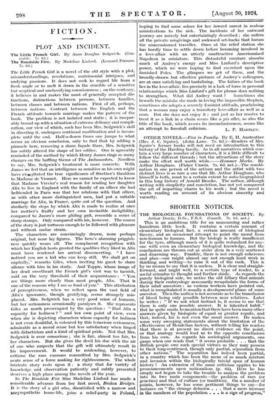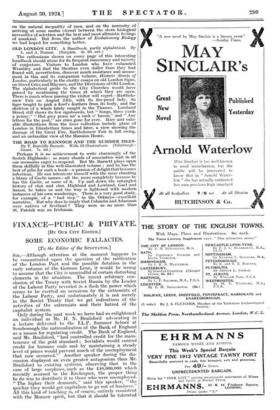SHORTER NOTICES.
THE BIOLOGICAL FOUNDATIONS OF SOCIETY. By, Arthur Dendy, D.Sc., F.R.S. (Cassell. 7s. 6d. net.)
This is an ambitious title for an unassuming and rather humdrum little book. It contains a certain amount of elementary biological fact, a certain amount of biological theory, and an occasional attempt to point the moral from non-human to human. But the biology is really insufficient for the tyro, although much of it is quite redundant for any- one with even an elementary biological knowledge, and the conclusions are thrown out as obiter dicta in a very scattered and disarming way. Frankly, there is not enough coherence and plan—one might almost say not enough hard work in thinking and writing—to raise it out of the ruck. This is by no means to say that it is useless. It is clear and straight- forward, and might well, to a certain type of reader, be a useful stimulus to thought and further study. As regards the purely biological side, we notice the old fallacy that animals during their embryology necessarily recapitulate the forms of their adult ancestors : as various workers have pointed out, what is recapitulated is usually a developmental phase of some ancestor. Then the author is not accurate as to the transfusion of blood being only possible between near relatives. Later he writes : "If we ask what instinct is, it seems to me that there is only one possible answer. It is inherited habit." But he quite omits to mention that there have been many other answers given by biologists of equal or greater repute, and that, indeed, his is not even the usual answer. He makes some very sweeping statements about the limitation of the effectiveness of Mendelian factors, without telling his readers that there is at present no direct evidence on the point, or that analogy would lead us to the opposite conclusions from his own. As regards his sociological arguments, one gasps when one reads that "it seems probable . . . that the British people owe such special virtues as they may possess to their long-continued, though only partial, separation from other nations." The separation has indeed been partial, in a country which has been the scene of so much mixture and invasion within the biologically trivial span of human history ! An extension of the same criticism applies to his pronouncements upon nationalism (p. 63). Here he has simply not begun to take the trouble to analyse the problem into its two main components—the problem of race (or genetics) and that of culture (or tradition). On a number of points, however, he has some pertinent things to say—for instance on "the strange delusion. . . that a mere increase in the numbers of the population.. . is a sign of progress,"
on the natural inequality of men, and on the necessity of arriving at some modus vivendi between the stern biological necessities of selection and the best and most altruistic feelings of mankind But from the author of Evolutionary Biology we had hoped for something better.



































 Previous page
Previous page